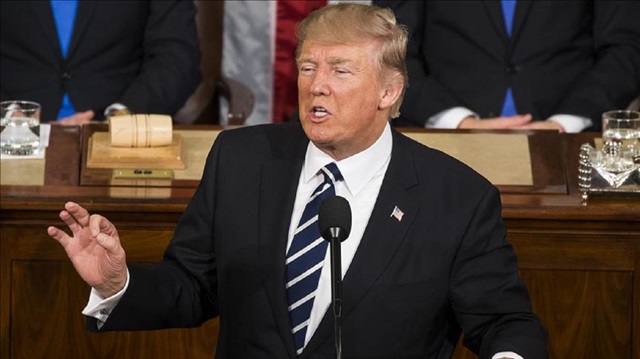
US to base strategy 'on conditions'; will not discuss troop levels
President Donald Trump announced Monday the U.S. would not commit to any timetable to end its military presence in Afghanistan where it has been bogged down for the better part of two decades.
“A core pillar of our new strategy is a shift from a time-based approach to one based on conditions,” Trump said during a nationally televised address from Joint Base Myer-Henderson Hall outside Washington.
“We will not talk about numbers of troops, or our plans for further military activity. Conditions on the ground, not arbitrary timetables, will guide our strategy from now on,” he added.
The U.S. has about 8,400 troops in the country, and Trump's comments made it clear there would be no indications about future modifications to the American forces.
But Defense Secretary James Mattis hinted in a statement released shortly after Trump concluded his remarks that the U.S. will be bolstering its forces alongside its allies.
"I will be in consultation with the Secretary General of NATO and our allies—several of which have also committed to increasing their troop numbers. Together, we will assist the Afghan Security forces to destroy the terrorist hub," he said.
Approximately 5,000 other foreign military troops are in Afghanistan, but all save the Americans have been devoted solely to a program to build up Afghan forces. At its peak the U.S. had about 100,000 troops in Afghanistan.
Trump met with top advisors Friday at the Camp David presidential retreat to discuss a path forward in America’s 16-year occupation of the South Asian country.
The commander of U.S. forces in Afghanistan, Gen. John W. Nicholson, had urged Trump to increase the footprint of U.S. forces there by about 4,000 troops amid a stalemate between an insurgency and the central government.
Trump said the U.S. would continue its cooperation with Kabul "as long as we see determination and progress", but warned U.S. support "is not a blank check".
The American president further called out Pakistan, saying it provides "safe havens for terrorist organizations" that have contributed to the ongoing tumult in Afghanistan.
Pakistan "has much to lose by continuing to harbor criminals and terrorists", Trump said in his first primetime policy speech.
“It is time for Pakistan to demonstrate its commitment to civilization,” Trump warned.
He further turned to Islamabad's arch-rival, India, saying the U.S. is seeking increased cooperation with New Delhi in Afghanistan.
Responding to the speech, Dr. Wilmer Leon said that while Trump claims to have learned from history, "what he should have learned is that Afghanistan is where empires go to die".
"Alexander the Great could not do it; Russia could not do it. You are replacing war elephants with F-16's [and] the outcome is still the same," said Leon, a political scientist who hosts Inside the Issues on Sirius/XM satellite radio. "We do have the watches but they have the time."
The U.S. invaded Afghanistan in the aftermath of the Sept. 11, 2001, terror attacks, ousting the Taliban after it gave sanctuary to now deceased al-Qaeda founder Osama bin Laden.
But recent years have seen the Taliban and other extremist groups grow in strength as the U.S.-backed central government in Kabul struggles to assert its authority across the country it nominally controls.


